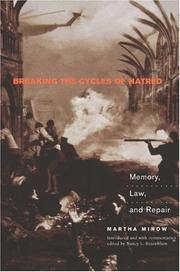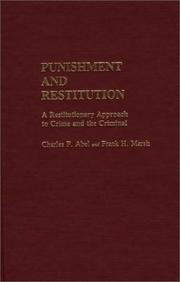| Listing 1 - 10 of 47 | << page >> |
Sort by
|
Book
ISBN: 9544772189 Year: 2014 Publisher: Bulgaria : Centăr za izsledvane na demokracijata,
Abstract | Keywords | Export | Availability | Bookmark
 Loading...
Loading...Choose an application
- Reference Manager
- EndNote
- RefWorks (Direct export to RefWorks)
This report was prepared in the context of the Study RECAST – REuse of Confiscated Assets for social purposes: towards common EU Standards. The Study was awarded to the University of Palermo – Department of European Studies and International Integration (coordinator: Giovanni Fiandaca, professor of criminal law) by the European Commission, DG Home Affairs, under the 2010 ISEC Programme. It was carried out in cooperation with the Center for the Study of Democracy and the FLARE Network (co-beneficiaries) and with the support of the Italian Agenzia nazionale per l’amministrazione e la destinazione dei beni sequestrati e confiscati alla criminalità organizzata and UNICRI (associate partners). This report analyses laws and practices for the management and disposal of confiscated assets in the European Union. The analysis explores the challenges and best practices of the Member States in this hitherto neglected area and strives to contribute to improvement of the overall effectiveness of the existing confiscation systems. This mapping has been carried out by the University of Palermo – Department of European Studies and International Integration (UNIPA) and by the Center for the Study of Democracy (CSD). The main tool used to gather relevant information was a questionnaire administered to one (or more) national expert/s in each Member State; this information was complemented with secondary data.
Book
ISBN: 1003021417 1000096246 9781000096248 9781003021414 9781000096286 1000096289 9781000096262 1000096262 0367532751 9780367532758 9780367893668 0367893665 Year: 2021 Publisher: London Routledge
Abstract | Keywords | Export | Availability | Bookmark
 Loading...
Loading...Choose an application
- Reference Manager
- EndNote
- RefWorks (Direct export to RefWorks)
The Second Edition of An Introduction to Transitional Justice provides a comprehensive overview of transitional justice judicial and non-judicial measures implemented by societies to redress legacies of massive human rights abuse. Written by some of the leading experts in the field, it takes a broad, interdisciplinary approach to the subject, addressing the dominant transitional justice mechanisms as well as key themes and challenges faced by scholars and practitioners. Using a wide historic and geographic range of case studies to illustrate key concepts and debates, and featuring discussion questions and suggestions for further reading, this is an essential introduction to the subject for students.
Book
ISBN: 0191738328 0191627593 1283579510 9786613891969 0191621927 9780191738326 Year: 2012 Publisher: Oxford : Oxford University Press,
Abstract | Keywords | Export | Availability | Bookmark
 Loading...
Loading...Choose an application
- Reference Manager
- EndNote
- RefWorks (Direct export to RefWorks)
Rwanda's Gacaca courts provide an innovative response to the genocide of 1994. Incorporating elements of both African dispute resolution and of Western-style criminal courts, Gacaca courts are in line with recent trends to revive traditional grassroots mechanisms as a way of addressing a violent past. Having been devised as a holistic approach to prosecution and punishment as well as to healing and repairing, they also reflect the increasing importance of victim participation ininternational criminal justice. This book critically examines the Gacaca courts' achievements as a mechanism of crimi
Gacaca justice system. --- Trials (Genocide) --- Transitional justice --- Reparation (Criminal justice) --- Rwanda --- History --- Compensation for victims of crime --- Criminal restitution --- Reparation --- Restitution (Criminal justice) --- Restitution for victims of crime --- Remedies (Law) --- Justice --- Human rights --- Justice, Administration of
Book
ISBN: 9004344713 9789004344716 9789004218215 9004218211 Year: 2017 Publisher: Leiden Boston
Abstract | Keywords | Export | Availability | Bookmark
 Loading...
Loading...Choose an application
- Reference Manager
- EndNote
- RefWorks (Direct export to RefWorks)
In Making Manslaughter, Susanne Pohl-Zucker offers parallel studies that trace the legal settlement of homicide in the duchy of Württemberg and the imperial city of Zurich between 1376 and 1700. Killings committed by men during disputes were frequently resolved by extrajudicial agreements during the late Middle Ages. Around 1500, customary strategies of dispute settlement were integrated and modified within contexts of increasing legal centralization and, in Württemberg, negotiated with the growing influence of the ius commune. Legal practice was characterized by indeterminacy and openness: categories and procedures proved flexible, and judicial outcomes were produced by governmental policies aimed at the re-establishment of peace as well as by the strategies and goals of all disputants involved in a homicide case.
Manslaughter --- Reparation (Criminal justice) --- Criminal homicide --- Homicide --- Compensation for victims of crime --- Criminal restitution --- Reparation --- Restitution (Criminal justice) --- Restitution for victims of crime --- Remedies (Law) --- Law and legislation --- History. --- Law and legislation&delete& --- History --- E-books
Book
ISBN: 1529222028 1529222036 1529222001 Year: 2023 Publisher: Bristol : Bristol University Press,
Abstract | Keywords | Export | Availability | Bookmark
 Loading...
Loading...Choose an application
- Reference Manager
- EndNote
- RefWorks (Direct export to RefWorks)
The key reference guide to rural crime and rural justice, this encyclopedia includes 85 concise and informative entries covering rural crime theories, offences, and control. It is divided into five complementary sections: theories of rural crime; rural crime studies; rural criminal justice studies and responses; rural people and groups; rural criminological research. With contributions from established and emerging international scholars, this authoritative guide offers state-of-the-art synopses of the key issues in rural crime, criminology, offending and victimisation, and both institutional and informal responses to rural crime.
Rural crimes --- Criminology --- Reparation (Criminal justice) --- Compensation for victims of crime --- Criminal restitution --- Reparation --- Restitution (Criminal justice) --- Restitution for victims of crime --- Remedies (Law) --- Crime --- Social sciences --- Criminals --- Crimes, Rural --- Study and teaching
Book
ISBN: 9789089743619 9089743618 Year: 2010 Volume: *18 Publisher: Den Haag Eleven international publishing
Abstract | Keywords | Export | Availability | Bookmark
 Loading...
Loading...Choose an application
- Reference Manager
- EndNote
- RefWorks (Direct export to RefWorks)
Restorative justice --- Reparation (Criminal justice) --- 395.3 --- herstelrecht --- mediation --- schuldbemiddeling --- Strafrecht --- Balanced and restorative justice --- BARJ (Restorative justice) --- Community justice --- Restorative community justice --- Criminal justice, Administration of --- Compensation for victims of crime --- Criminal restitution --- Reparation --- Restitution (Criminal justice) --- Restitution for victims of crime --- Remedies (Law) --- Europe --- Restorative justice - Europe --- Reparation (Criminal justice) - Europe

ISBN: 0879098740 0879098732 Year: 1977 Publisher: Reston Reston publishing company
Abstract | Keywords | Export | Availability | Bookmark
 Loading...
Loading...Choose an application
- Reference Manager
- EndNote
- RefWorks (Direct export to RefWorks)
Victims of crimes. --- Reparation (Criminal justice) --- Victimes d'actes criminels --- Réparation (Droit) --- 343.9 --- Criminologie --(algemeen) --- Reparation (Criminal justice). --- 343.9 Criminologie --(algemeen) --- Réparation (Droit) --- Victims of crimes --- Crime victims --- Victimology --- Victims --- Compensation for victims of crime --- Criminal restitution --- Reparation --- Restitution (Criminal justice) --- Restitution for victims of crime --- Remedies (Law)
Book
Abstract | Keywords | Export | Availability | Bookmark
 Loading...
Loading...Choose an application
- Reference Manager
- EndNote
- RefWorks (Direct export to RefWorks)
Reparation --- Victims of crimes --- Victimes d'actes criminels --- 343.9 --- -Victims of crimes --- -Crime victims --- Victimology --- Victims --- Compensation for victims of crime --- Criminal restitution --- Restitution (Criminal justice) --- Restitution for victims of crime --- Remedies (Law) --- Criminologie --(algemeen) --- Addresses, essays, lectures --- Reparation (Criminal justice) --- -Criminologie --(algemeen) --- 343.9 Criminologie --(algemeen)

ISBN: 0691096627 0691096635 9786612087677 9786612935305 1282935305 1282087673 1400825385 9781400825387 9780691096629 9780691096636 9781282087675 9781282935303 6612935308 6612087676 Year: 2009 Publisher: Princeton, NJ
Abstract | Keywords | Export | Availability | Bookmark
 Loading...
Loading...Choose an application
- Reference Manager
- EndNote
- RefWorks (Direct export to RefWorks)
Violence so often begets violence. Victims respond with revenge only to inspire seemingly endless cycles of retaliation. Conflicts between nations, between ethnic groups, between strangers, and between family members differ in so many ways and yet often share this dynamic. In this powerful and timely book Martha Minow and others ask: What explains these cycles and what can break them? What lessons can we draw from one form of violence that might be relevant to other forms? Can legal responses to violence provide accountability but avoid escalating vengeance? If so, what kinds of legal institutions and practices can make a difference? What kinds risk failure? Breaking the Cycles of Hatred represents a unique blend of political and legal theory, one that focuses on the double-edged role of memory in fueling cycles of hatred and maintaining justice and personal integrity. Its centerpiece comprises three penetrating essays by Minow. She argues that innovative legal institutions and practices, such as truth commissions and civil damage actions against groups that sponsor hate, often work better than more conventional criminal proceedings and sanctions. Minow also calls for more sustained attention to the underlying dynamics of violence, the connections between intergroup and intrafamily violence, and the wide range of possible responses to violence beyond criminalization. A vibrant set of freestanding responses from experts in political theory, psychology, history, and law examines past and potential avenues for breaking cycles of violence and for deepening our capacity to avoid becoming what we hate. The topics include hate crimes and hate-crimes legislation, child sexual abuse and the statute of limitations, and the American kidnapping and internment of Japanese Latin Americans during World War II. Commissioned by Nancy Rosenblum, the essays are by Ross E. Cheit, Marc Galanter, Fredrick C. Harris, Judith Lewis Herman, Carey Jaros, Frederick M. Lawrence, Austin Sarat, Ayelet Shachar, Eric K. Yamamoto, and Iris Marion Young.
Hate crimes. --- Violence (Law). --- Reparation (Criminal justice) --- Law reform. --- Crimes haineux . --- Violence --- Réparation (Droit) --- Droit --- Réforme --- Hate crimes --- Violence (Law) --- Law reform --- Réparation (Droit) --- Réforme --- Force (Law) --- Compensation for victims of crime --- Criminal restitution --- Reparation --- Restitution (Criminal justice) --- Restitution for victims of crime --- Legal reform --- Bias crimes --- Bias-related crimes --- Hate-motivated crimes --- Hate offenses --- Law --- Remedies (Law) --- Crime

ISBN: 0313237174 9780313237171 Year: 1984 Volume: 5 Publisher: Westport (Conn.): Greenwood
Abstract | Keywords | Export | Availability | Bookmark
 Loading...
Loading...Choose an application
- Reference Manager
- EndNote
- RefWorks (Direct export to RefWorks)
Reparation (Criminal justice) --- Punishment --- 343.9 --- Reparation --- Compensation for victims of crime --- Criminal restitution --- Restitution (Criminal justice) --- Restitution for victims of crime --- Remedies (Law) --- Penalties (Criminal law) --- Penology --- Corrections --- Impunity --- Retribution --- Criminologie --(algemeen) --- Punishment. --- Reparation (Criminal justice). --- 343.9 Criminologie --(algemeen)
| Listing 1 - 10 of 47 | << page >> |
Sort by
|

 Search
Search Feedback
Feedback About UniCat
About UniCat  Help
Help News
News